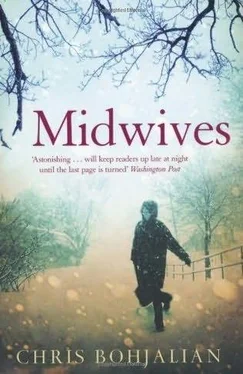Chris Bohjalian - Midwives
Здесь есть возможность читать онлайн «Chris Bohjalian - Midwives» весь текст электронной книги совершенно бесплатно (целиком полную версию без сокращений). В некоторых случаях можно слушать аудио, скачать через торрент в формате fb2 и присутствует краткое содержание. Жанр: Современная проза, на английском языке. Описание произведения, (предисловие) а так же отзывы посетителей доступны на портале библиотеки ЛибКат.
- Название:Midwives
- Автор:
- Жанр:
- Год:неизвестен
- ISBN:нет данных
- Рейтинг книги:5 / 5. Голосов: 1
-
Избранное:Добавить в избранное
- Отзывы:
-
Ваша оценка:
- 100
- 1
- 2
- 3
- 4
- 5
Midwives: краткое содержание, описание и аннотация
Предлагаем к чтению аннотацию, описание, краткое содержание или предисловие (зависит от того, что написал сам автор книги «Midwives»). Если вы не нашли необходимую информацию о книге — напишите в комментариях, мы постараемся отыскать её.
Midwives — читать онлайн бесплатно полную книгу (весь текст) целиком
Ниже представлен текст книги, разбитый по страницам. Система сохранения места последней прочитанной страницы, позволяет с удобством читать онлайн бесплатно книгу «Midwives», без необходимости каждый раз заново искать на чём Вы остановились. Поставьте закладку, и сможете в любой момент перейти на страницу, на которой закончили чтение.
Интервал:
Закладка:
"Is this dangerous?"
"Absolutely. If you strain enough and become sufficiently hypoxic, your heart can slow down or even stop. It's a sort of reflex mediated by the vagus nerve. Your heart stops and you pass out. As some doctors say, you vagal out."
"Can you die?"
"Oh yes, indeed one can. But women in labor almost never do, because a delivery room nurse or an ob-gyn knows exactly what the early symptoms look like, exactly what the first signs are. And it's very easy to treat: You simply have the laboring woman relax for a bit or-in an extreme case-you administer oxygen."
"What makes you think Charlotte vagaled?"
"First of all, she evidenced the symptoms of a person going hypoxic: She had a seizure, lost consciousness, and her heart stopped. That's what the eyewitnesses may have seen. Then, when we were looking for injuries to brain cells in the hippocampus, we saw significant evidence of hypoxia."
"What does that look like?"
"The nucleus of the cell becomes pycnotic-shrunken and dark and really rather unattractive. Meanwhile the cytoplasm of the cell body becomes a deep red, and looks almost glassy."
"So you're saying Charlotte Bedford was forced… you're saying Charlotte Bedford pushed for so long she went hypoxic. She vagaled."
"Yes."
"In your opinion, was that the cause of death?"
"Well, that's the thing, I don't think so."
"Why not?"
"This is going to sound pretty ironic, given the reason we've all assembled here, but I believe Mrs. Danforth saved her life after she vagaled. I'm convinced that the CPR Mrs. Danforth performed-all those cycles-actually brought the woman back."
Dr. Tierney's opinion was not a surprise to our family, and my mother barely moved when he spoke. But it was a revelation to most of the crowd, and one of the mothers in the back row must have moved with such suddenness or gasped just loud enough that she woke her infant. We all heard a moment of crying, followed by the rustling we'd all become used to, as the infant's mother worked her way down the thin space between benches and then out of the courtroom.
"What makes you think so?" Tanner asked when the room had settled.
"The amount of blood in the peritoneal cavity-the abdomen. I mean, there were close to seven hundred and fifty milliliters in there."
"Over two pints?"
"Roughly. Plus there was all the blood outside of the wound: Around the incision. On the bedding. And, of course, on that pillow Mrs. Danforth had used to soak some up so she could see what she was doing. Find the uterus, I guess. In my opinion, there would not have been that much blood in the deceased's abdomen and around the bedding if the woman had been dead when Mrs. Danforth tried to perform a cesarean section."
"And so you believe Charlotte Bedford was alive when Mrs. Danforth performed the cesarean?"
"That's correct."
"In that case, what was the cause of death? How did Charlotte Bedford die?"
Dr. Tierney sighed and then looked right at the jury. "As I myself typed on the death certificate-the final one-she died of hemorrhagic shock caused by the cesarean section. In my opinion, it was Mrs. Danforth's C-section that killed her."
Chapter 19.
I don't toss and turn, it's not like that. Sometimes I don't even remember listening to Rand's breathing for hours, feeling the heat from his body under the blanket. But in the morning, it's often like I haven't slept. I'm cranky and tired and I go to rooms that are empty and cry.
Stephen says Charlotte's sister doesn't hate me. But he's not a woman, he's never been through labor. He's never seen life surge into a room at birth.
On this one he's wrong.
– from the notebooks of Sibyl Danforth, midwife
I WANTED STEPHEN TO TEAR Tierney apart. I knew the medical examiner had been a devastating witness; I understood how powerful his testimony had been: He sounded intelligent and authoritative; he seemed unassailably reasonable. He looked good on the witness stand.
But I also understood that if Tierney's damage could be undone, most of the repair work would have to wait until the following week, when Stephen would put our own "experts" on the stand. Then, I hoped, everyone in the courtroom would see that Dr. Tierney was merely the Vermont coroner. He wasn't from Boston or New York City or Washington, D.C. Tierney's opinion was only one among many, and his was most certainly mistaken: Eventually the jury would be convinced that Charlotte Bedford had been dead beyond question when my mother decided to rescue little Veil.
Stephen, of course, would curry no favor with an Orleans County jury by undermining Tierney simply because he was from Vermont. And so most of his strategy during his cross-examination of the medical examiner late Friday afternoon was simply to lay the groundwork for his own forensic pathologists, and to suggest that there was going to be wide room for disagreement.
"You testified that Mrs. Bedford had about seven hundred and fifty milliliters of blood in her abdomen. Am I correct?" he asked at one point.
"About that, yes."
"If someone approached you and said a woman had died as a result of a cesarean section done under… under these circumstances, wouldn't you have expected more blood?"
Tanner stood to object, arguing that it was ridiculous to ask the coroner to conjecture about a hypothetical situation when there was an actual cesarean to discuss, but the judge allowed Stephen to proceed.
"Seven hundred and fifty milliliters is a good amount of blood," Tierney answered.
"But… but… if someone told you a woman had died from a C-section… wouldn't you have expected to find more than that?"
Tierney thought for a long moment. Finally: "I might have."
"Thank you. If you wanted categorical… indisputable… irrefutable proof that a cesarean section had been the cause of death, how many milliliters of blood would you want to discover in the abdominal cavity?"
Tierney nodded his head slightly as he pondered his response. "Perhaps one thousand," he said.
"Was there that much blood in Charlotte Bedford's abdominal cavity?"
"No."
"Thank you," Stephen said, and he started back to his table. "No further questions." For a brief second I thought this would mark the end of the day-and, therefore, the week-and I grew excited. This seemed to be a wonderful note on which to send the jurors home for the weekend.
But before Stephen had even retaken his chair, Tanner was on his feet for the prosecution's redirection.
"Two quick questions, Dr. Tierney, if I may," he began. "Given everything else you learned from the autopsy, and given the huge amounts of blood that were found outside of the abdominal cavity-such as all that blood Mrs. Danforth soaked up with the pillow-was seven hundred and fifty milliliters enough to convince you that the cesarean had been the cause of death?"
"Yes, most certainly."
"Given all of your experience, and all of the time you have spent on this particular case, do you believe the cause of death was the cesarean section performed by the defendant?"
"Yes, I do."
"Thank you," Tanner said, and Judge Dorset looked up at the clock on the far wall. It was well after five, and the first week of my mother's trial was about to be gaveled to a close.
Before we all left the courthouse and went our separate ways Friday evening, Stephen tried to reassure my parents that this would be the low point of the trial for us-literally, in terms of what my mother's prospects for acquittal appeared to be, as well as emotionally. After all, the State had presented virtually its entire case-the only remaining witness was the widower himself-while we hadn't even begun our defense.
Stephen warned us that during the weekend we could find ourselves preoccupied with what the jury was thinking, and we could become alarmed.
Читать дальшеИнтервал:
Закладка:
Похожие книги на «Midwives»
Представляем Вашему вниманию похожие книги на «Midwives» списком для выбора. Мы отобрали схожую по названию и смыслу литературу в надежде предоставить читателям больше вариантов отыскать новые, интересные, ещё непрочитанные произведения.
Обсуждение, отзывы о книге «Midwives» и просто собственные мнения читателей. Оставьте ваши комментарии, напишите, что Вы думаете о произведении, его смысле или главных героях. Укажите что конкретно понравилось, а что нет, и почему Вы так считаете.











